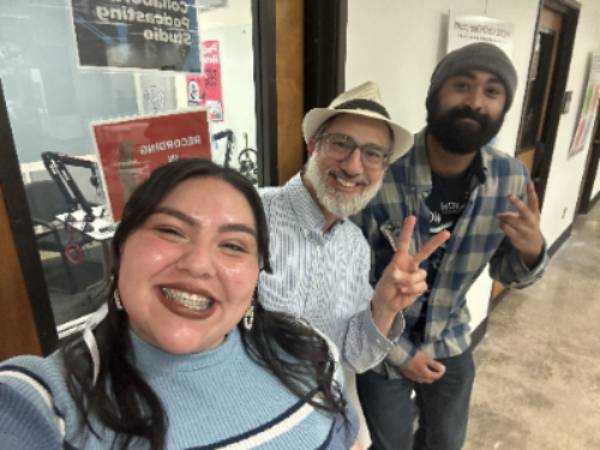Meeting Mark Marino!

I met Mark Marino! 🤯
During my first semester as a graduate student at SDSU, I took Professor Pressman's Digital Humanities course wherein she assigned part of Marino's Critical Code Studies as a reading.
Reading it, I was immediately hooked by Marino's amazingly done scholarship that explained what Critical Code Studies (CCS) is and why it's important. With the effective examples that he used, It felt almost obvious and irrefutable that of course code has biases within it and needs to be studied; It just made perfect sense.
Part of my final essay in Professor Pressman's class ended up focusing on a codework piece by Mez Breeze and Lillian-Yvonne Bertram's Travesty Generator, both of which Mark Marino has written and provided useful scholarship on. His work and formalization of CCS allowed me to analyze these E-Lit pieces from a completely new angle, opening up opportunities for my own scholarly journey I didn't know possible.
In my now fourth and final semester, I can look back and say how profusely thankful I am for both Professor Pressman for introducing me to Mark Marino and for Marino himself for all the scholarship he has done that helped guide my own research. I ended up returning to that first semester paper and revised it to become my Capstone Portfolio Project, a project for which I proudly received a pass on. Despite the additional research, reading, and revisions I had to do to complete that culminating paper, I still kept returning to Marino. No matter what cuts or alterations were made, he stuck.
It's been a wild ride from not even knowing who Mark Marino or what CCS is to attending his lecture and getting to sit and talk with him afterwards for over an hour, asking questions I probably would have never even thought to ask during that first semester, I even found out we both watch Severance!
During Marino's lecture, you could feel the unwavering attention of the room focused on him, the students and faculty actively engaged and eager to ask their questions and hear what he has to say. He mentioned multiple of his projects, my favorite being The Grand Exhibition of Prompts which focuses not on the AI generated artwork that prompts can generate, but instead on the uniqueness of the prompts themselves. He also discussed human's own relation to code and technology, citing the computer science theory of the "Eliza effect" which I found particularly fascinating and would love to do further research on. The variety of projects he has done, the scholarship he cited and has completed himself, as well as the approachability and kindness that he exudes all combine within Mark Marino to create a wonderfully knowledgeable and kind-hearted person and I feel incredibly lucky I was able to see him and speak with him.
In attending the event, It was also nice to see such a packed room of people all caring about the Digital Humanities. Being able to witness just one of the fruits of the labor that the DH scholars at SDSU have been putting in for years in order to cultivating spaces like this was inspiring.
Getting to meet Mark Marino in my last semester at SDSU has been a wonderful bookend to my experience here and I'm honored that I got to speak so closely with him (and have him sign my book!) SDSU, The Digital Humanities Initiative, and the faculty that work with students to encourage and nurture further studying of Digital Humanities and E-Lit have provided wonderful opportunities for myself and other students and I couldn't be more thankful.

